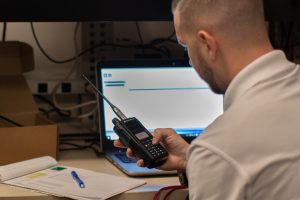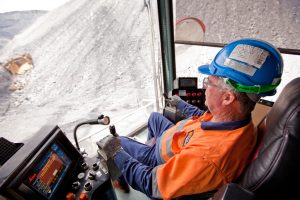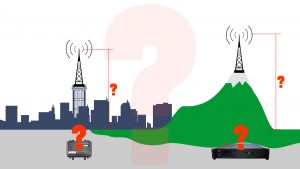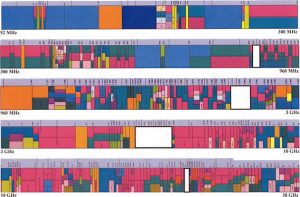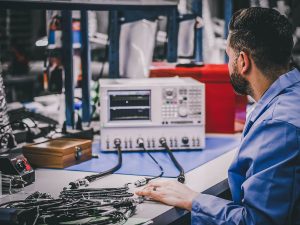Need your radios programmed in a hurry?
We’ve got you covered. Contact Us.
The two-way radios available today are advanced pieces of communications technology, a far cry from the ‘walkie-talkies’ you might have played with as a kid. In the same way a computer can be customized with different software, two-way radios can be programmed to use certain frequencies and manufacturer supported applications. They can even be used to open gates and shut down equipment if programmed correctly.
Alberta radio users have come to rely on two-way radios in nearly every work environment: The Fort McMurray Oil Sands, West Edmonton Mall, on campus at the University of Calgary – you name it.
Because of how integrated two-way radios are into the operations of large organizations, getting them programmed correctly matters. Imagine not being able to use your phone or email account – at all – and you’ll have an idea of the challenges an incorrectly programmed radio can present.
That’s why it’s important to have your radios programmed by someone who understands the software, the technology, and the process. Going with a less-than experienced technician, or trying to do it on your own, can leave you with a litany of problems.
These are just a few of them.
Your Radios Won’t “Talk to Each Other”
This is the most basic, but it’s also the reason most businesses invest in two-way radios: voice communication. A member of your team should be able to hit the transmit button, speak, and have the appropriate person or people hear what they have to say. When a radio is programmed with the correct frequencies on the proper channels, that happens.
Problems can arise when programming is wrong. If mistakes are made it can be like trying to make a call on your phone when you’re out of service – you get nowhere.
That would be bad enough if it was just a matter of frustration. But, when two-way radios can’t talk to each other, that means your team can’t communicate. And that could mean potential downtime and safety risks on the job site.
Your Radios Won’t Talk to Your Infrastructure
This becomes a big deal when your team is spread out over a wide area, like a mine site north of Fort McMurray. In these cases, repeaters are often used to carry RF signals across longer distances and connect teams who need coverage over a wide area. In the same way that radios need to be programmed correctly to ‘talk’ to each other, they need to be programmed correctly to talk to the repeaters, as well. And just like you might expect, repeaters need to be programmed so they can talk back.
Mistakes made in the programming mean that the repeaters will struggle to do their job, and your widespread team will struggle to stay connected.
Communication Could Become Disorganized
Think about how many groups of employees are working on that Fort McMurray mine in the last example: You have drivers, heavy equipment operators, chemical engineers, safety inspectors, emergency responders, just to name a few. An Edmonton hotel has several teams, as well – security, hospitality, housekeeping, management, and so on… With so many teams doing so many different jobs, the need to program radios properly is made clear. Specifically, we’re talking about ‘talk groups’.
Each one of the teams mentioned above can have their two-way radios programmed so their conversations don’t overlap or interrupt the conversations of another team. Safe inspectors only talk to safety inspectors, engineers to engineers, and so on. Managers can have special programming on their radios that let them talk to each group, or to all groups at once if and when they need to.
Getting the programming right means that communication will flow smoothly. Getting it wrong, on the other hand, could mean that radio calls go to the wrong team, making communication frustrating and distracting for people trying to do their jobs.
You Could Face Hefty Fines
One thing radio technicians worth their salt know is that the regulations surrounding two-way radio use are complicated. When you ask them to program certain frequencies, for example, they will ask you, “Do you have the license?”.
This is a critical question. Here’s why.
Canada’s radio frequencies are regulated by ISED (Innovation, Science and Economic Development Canada, formerly Industry Canada). You need a license to use most of the frequencies on the RF spectrum and those licenses are not free.
The cost of a frequency license can depend on several factors – like the frequency band you want to use and the number of devices. While purchasing a frequency license can be expensive, using a regulated portion of the spectrum without a license can get you in serious hot water.
You can click here for more information from ISED, but in a nutshell: First-time violators can be fined as much as $25,000, and those fines can go all the way up to $50,000 for repeat offenses. And for business users? The fines range anywhere from a maximum of $10 million (for the first offense) to $15 million (for subsequent violations).
Before they program your two-way radios, your provider should ask you (or already know) if you have the license to use them. If not, that’s a red flag. At Tridon, our technical and sales teams will make sure you have the authorization you need so this doesn’t happen to you.
If you need help getting a frequency license, Contact Us and we’ll get started.
Note: There are certain frequencies that are open to the public, free for anyone and everyone to use, no license required. This may sound like a great deal, but there is no guarantee of privacy on these frequencies. You could face interference with communications and operations if you rely on them. Going with the licensed option may be more expensive, but it is also more reliable.
Getting Started
Getting programming right matters. It helps ensure the radios will work as you need them to. It keeps communication organized, which keeps your teams productive and safe.
That’s why it’s important to go with experienced technicians when getting your radios programmed. Tell them what you need, and they’ll make sure they ask all the right questions about how you plan to use the radios and how you need them to work.
Going with the discount option instead of a professional solution may seem like a good idea when you’re planning your project, but all too often that has resulted in problems that show up at the last minute. When that happens, you’ll have crews on site, sitting idle as you try and contact someone to fix the problem in a hurry. That means costly downtime and potentially being charged a ‘rush order’ fee for the reprogramming work.
Better to get it done right, by the right people, the first time. If you have any questions about programming, or you have a project coming up and you want your radios programmed, just Contact Us.
Tridon is a full solution Telecom Systems Integrator with CSA certification and licensed by APEGA. Our Engineering, Service and Tower Divisions collaborate with customers to build engineered solutions including communications systems design, tower inspections and co-location, wireless broadband, fiber optic cabling, site security, and two-way radio communication.

